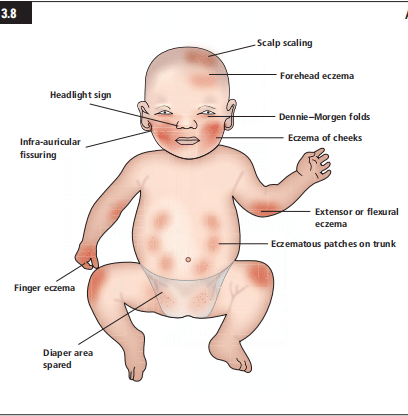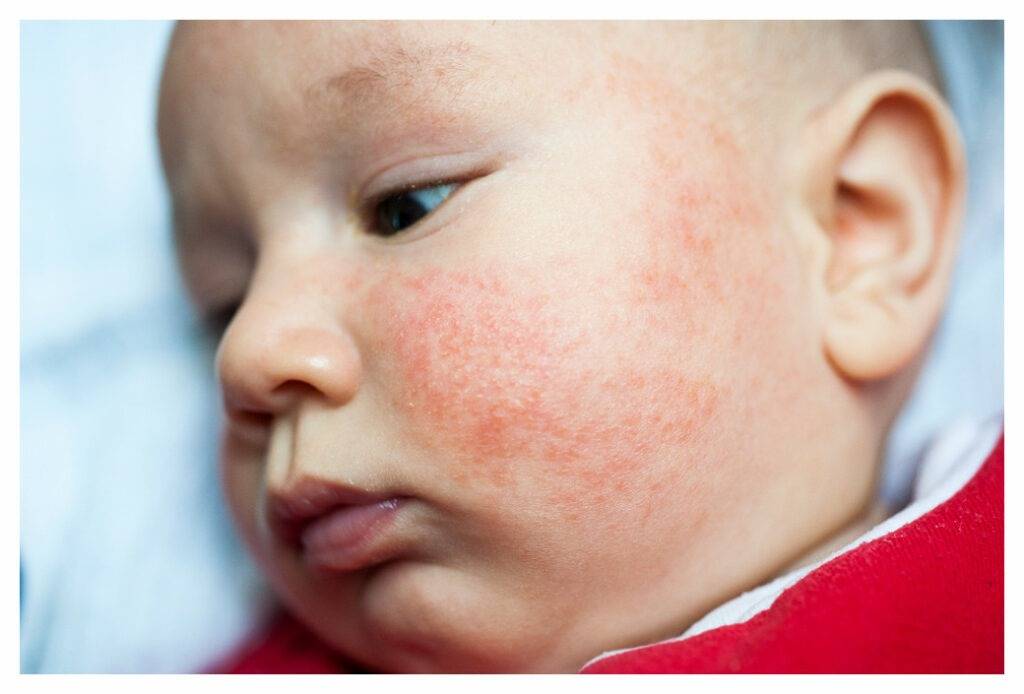The Signs of Eczema in Infants: A Guide for Parents
Eczema, also known as atopic dermatitis, is a common skin condition in infants. It causes dry, itchy, and sometimes inflamed skin, which can be uncomfortable for babies and worrying for parents.
Recognising the signs of eczema in infants early on can help you act quickly, manage flare-ups, and keep your little one as comfortable as possible. In this guide, we’ll explore what eczema looks like in infants, how to spot the symptoms, and what you can do to support their skin.
Key Takeaways:
- Eczema in infants is common and manageable.
- Look out for dry, itchy, or inflamed patches on the face and body.
- A gentle routine with moisturiser and mild cleansers can calm the skin.
- See a doctor if symptoms worsen, ooze, or don’t respond to home care.

What is Infant Eczema?
Infant eczema is a skin condition that causes patches of dry, irritated, and often itchy skin. It typically appears on the face, arms, and legs but can occur anywhere on the body. For many babies, eczema starts in the first few months of life and may continue through childhood.
Although the exact cause of eczema is unknown, scientists believe a combination of genetic and environmental factors is responsible. Babies with a family history of eczema, asthma, or allergies are more likely to develop the condition. However, with the right care, you can manage eczema effectively and reduce discomfort for your baby.
For more medical detail, you can also read the NHS overview of atopic eczema in children.
For a deeper dive into different eczema types, you can read our guide on types of eczema in Ireland
Common Signs of Eczema in Infants
Identifying the signs of eczema in infants can help you take early action. Here are the most common symptoms to look out for:
- Dry, Flaky Skin: One of the first signs of eczema is dry, rough patches of skin. You may notice these areas feel rougher than the surrounding skin.
- Eczema frequently results in red, irritated patches. On darker skin, these patches might appear darker or lighter than the surrounding skin.
- Small Bumps or Blisters: In some cases, eczema can cause small bumps that may ooze or crust over.
- Itching: Babies with eczema often scratch or rub the affected areas, especially when the skin feels itchy.
- Thickened Skin: With long-term eczema, the skin in affected areas can become thicker and may have a leathery texture.
How to Spot Eczema on Different Parts of an Infant’s Body
Eczema can appear on various parts of an infant’s body, and each area may look a bit different. Here’s a breakdown of what to look for:
1. Face and Cheeks
- Patches of red or pink appear on the cheeks, forehead, or around the mouth.
- Dry, flaky skin could appear rough or irritated.
- Babies may rub their faces, especially during feeding.
2. Scalp
- Dry, flaky patches that look like dandruff
- Your baby may rub their head due to itchiness.
- The baby may experience hair loss if they scratch frequently.
3. Arms and Legs
- Red, itchy patches on the arms, elbows, knees, and thighs
- Skin may feel rough or bumpy in these areas.
- Babies may scratch or rub against surfaces to relieve itching.
4. Trunk (Back and Chest)
- Dry, inflamed patches on the chest, back, or sides
- This area is affected less often than the face or limbs, but flare-ups can still appear here, especially during bad eczema phases.
Infographic: Common Areas for Eczema in Infants

Why Do Infants Get Eczema?
A variety of factors, including genetics and environment, can cause eczema in infants. Here’s a quick look at some common triggers:
- Genetics: If parents have a history of eczema, asthma, or allergies, the baby is more likely to develop eczema.
- Dry Skin: Babies have delicate skin that dries out easily, especially in dry or cold climates.
- Allergens: Environmental allergens like pet dander, pollen, or dust can trigger eczema.
- Heat and Sweat: Heat or sweat can irritate sensitive skin, leading to a flare-up.
- Irritants: Soaps, detergents, or even rough fabrics can cause irritation.
How to Care for Eczema-Prone Skin
Once you recognise the signs of eczema in infants, there are steps you can take to manage the condition. Here are some helpful tips:
1. Moisturise Regularly
- Apply a gentle, fragrance-free moisturiser at least twice a day.
- Look for products designed for sensitive skin or eczema-prone skin.
- Moisturise immediately after bath time to lock in moisture.
2. Use Gentle Bathing Techniques
- Limit bath time to 5-10 minutes with lukewarm water.
- Use mild, fragrance-free soap or no soap at all for sensitive areas.
- Pat the skin dry gently; avoid rubbing with a towel.
3. Dress in Soft, Breathable Fabrics
- Choose clothes made from cotton or other soft, breathable materials.
- Avoid wool or synthetic fabrics that can irritate the skin.
- Dress your baby in layers to prevent overheating.
4. Watch for Triggers
- Identify any environmental triggers that seem to worsen your baby’s eczema.
- Keep the home clean to reduce dust, pet dander, or pollen.
- Avoid using heavily scented products around your baby.
Many parents find a gentle, fragrance-free moisturiser, like Bragan Skincare’s Atopic Cream, helpful for daily care.
When to See a Doctor
While mild cases of eczema can often be managed at home, it’s important to know when to consult a healthcare professional. Here are some signs that you should seek medical advice:
- Severe Itching or Discomfort: If your baby seems very uncomfortable or irritable due to itching.
- Oozing or Crusting: If the eczema patches start to ooze, crust, or look infected, see a doctor.
- Persistent or Worsening Symptoms: If the eczema doesn’t improve with home care or seems to be spreading.
A paediatrician or dermatologist can provide additional treatments, such as medicated creams, if needed.

Frequently Asked Questions About Eczema in Infants
Q1: Can eczema be cured?
A: Eczema is a chronic condition, meaning there’s no cure. However, we can manage the symptoms, and many infants outgrow eczema as they grow older.
Q2: Can breastfeeding help prevent eczema?
A: Some studies suggest that breastfeeding may help reduce the risk of eczema in infants, but results are not conclusive. It’s best to talk to your doctor about what’s right for your baby.
Q3: Does food cause eczema?
A: Certain foods may trigger eczema in some babies, especially those with allergies. If you suspect a food trigger, talk to your paediatrician before making dietary changes.
Q4: Is eczema contagious?
A: No, eczema is not contagious. Eczema cannot be transmitted from one individual to another.
Q5: Will my baby outgrow eczema?
A: Many children experience improvement as they grow older, and some may even outgrow eczema entirely. However, some children may continue to have sensitive skin throughout their lives.
Creating a Routine for Eczema-Prone Skin
Having a consistent skincare routine can make a huge difference for infants with eczema. Here’s a simple daily routine to help manage the signs of eczema in infants:
- Morning: moisturise after waking up. Dress your baby in soft, breathable clothes.
- Afternoon: Apply moisturiser if you notice any dry spots.
- Evening: Give a gentle bath followed by a moisturiser. Use gentle, fragrance-free products.
- Night: Dress your baby in soft pyjamas and use cotton sheets for their bedding.
Final Thoughts: Managing Eczema with Confidence
Any parent worries about their baby’s eczema. But with proper treatment, you can keep them comfortable. Regular moisturising, gentle cleansing, and avoiding triggers can all help soothe your baby’s skin. Remember, you’re not alone, and many other parents face the same challenges.
If you’re ever in doubt, don’t hesitate to consult your pediatrician or dermatologist. They can provide guidance and support, helping you create a care plan that works for your baby’s unique needs. With a little patience and the right approach, you can help your baby’s skin stay healthy and soft, giving them the comfort they need to grow and thrive.
Additional Tips for Managing Eczema in Infants
While a regular skincare routine is essential, there are a few extra steps that can further help in managing the signs of eczema in infants. These additional tips can make a big difference in keeping your baby’s skin calm and comfortable.
1. Keep Nails Short and Covered
Babies naturally want to scratch itchy areas, but scratching can make eczema worse and even lead to infection. To prevent this, keep your baby’s nails trimmed and, if necessary, use soft mittens to cover their hands, especially during naps and at night.
2. Use a Humidifier
Dry air, especially in winter or dry climates, can worsen eczema. Using a humidifier in your baby’s room can add moisture to the air, helping to prevent skin from drying out. Just be sure to clean the humidifier regularly to prevent mold or bacteria buildup.
3. Avoid Sudden Temperature Changes
Eczema-prone skin can react to sudden changes in temperature, leading to flare-ups. Try to keep your baby’s environment at a consistent, comfortable temperature. When venturing outdoors in cold weather, dress them in layers that are easily removable indoors.
4. Limit Exposure to Chlorine
If you take your baby to a swimming pool, be mindful of chlorine, which can irritate sensitive skin. Rinse their skin immediately after swimming and apply a moisturiser to keep the skin hydrated. Some parents find that using barrier creams before swimming helps protect their baby’s skin from chlorine exposure.
Natural Remedies for Eczema Relief
While there’s no substitute for medical treatment, some natural remedies may provide gentle relief for babies with eczema. Always test a small amount on a patch of skin first to ensure there’s no allergic reaction.
Snail Mucin
Snail mucin has been traditionally used to soothe irritated skin. It is known for its moisturising and barrier-supporting properties, which can help keep delicate infant skin hydrated and comfortable.
Coconut Oil
Coconut oil is a natural moisturiser that has anti-inflammatory properties. Apply a small amount of cold-pressed, organic coconut oil to affected areas to help lock in moisture.
Oatmeal Baths
An oatmeal bath can help soothe itchy skin. Simply grind plain oats into a fine powder and sprinkle them into your baby’s bath. This can help reduce inflammation and relieve itching.
Aloe Vera
Aloe vera is known for its soothing and moisturising properties. Use pure aloe vera gel, free from added fragrances or colours, on eczema-prone areas. It can help calm irritation and reduce redness.
How to Support Your Baby’s Immune System
A strong immune system can help reduce the severity of eczema. Here are some gentle ways to support your baby’s immune health, which may indirectly benefit their skin.
- Breastfeeding: If possible, breastfeeding can help provide essential nutrients and antibodies that support your baby’s immune system.
- Introduce Solid Foods Gradually: When starting solids, introduce one food at a time. This can help you identify any potential food sensitivities that may contribute to eczema flare-ups.
- Consult Your Paediatrician: Talk to your doctor about any concerns related to food allergies or sensitivity. They can provide guidance on how to introduce foods safely.
Products to Avoid for Babies with Eczema
Certain products can make eczema worse, so it’s essential to choose items that are gentle and safe for sensitive skin. Here’s a quick list of products to avoid:
- Scented Soaps and Lotions: Fragrances can irritate sensitive skin, so opt for fragrance-free products.
- Bubble Baths: Bubble baths often contain harsh chemicals that can dry out the skin. Stick to gentle, unscented cleansers.
- Laundry Detergents with Dyes and Fragrances: Choose a detergent specifically designed for sensitive skin, free from dyes and fragrances, to wash your baby’s clothes and bedding.
Preventing Eczema Flare-Ups: Tips for Everyday Care
Managing the signs of eczema in infants requires daily attention, but with a few preventive measures, you can help keep flare-ups to a minimum.
1. Bathe with Care
- Limit bath time to 5–10 minutes, as prolonged exposure to water can dry out the skin.
- Use lukewarm water instead of hot water, which can strip the skin of natural oils.
- After the bath, pat the skin dry and apply moisturiser immediately to seal in moisture.
2. Use Moisturiser Frequently
- Apply a gentle, eczema-safe moisturiser twice a day to keep the skin hydrated.
- For babies with frequent flare-ups, apply moisturiser even more frequently, as needed.
- Choose creams or ointments over lotions, as they provide more hydration.
3. Keep Your Baby Comfortable
- Dress your baby in breathable, soft fabrics like cotton.
- Avoid tight or scratchy clothing, which can irritate the skin.
- Use soft bedding materials, and keep your baby’s sleeping environment clean and free from allergens.
A Parent’s Guide to Emotional Support and Patience
Caring for a baby with eczema can be challenging. Watching your baby experience discomfort can be difficult, and managing eczema requires patience. Here are some tips to stay positive and offer emotional support to both your baby and yourself.
1. Stay Consistent with Care
Building a consistent skincare routine not only helps your baby but also gives you a sense of control. Routine helps create habits, making eczema management a natural part of daily life.
2. Celebrate Small Wins
Managing eczema is a journey. Celebrate the small victories—like a day without itching or a week of improved skin condition. Acknowledging progress can help you stay motivated and positive.
3. Take Care of Yourself
As a carer, it’s essential to take time for yourself. Self-care can help you manage stress, which is crucial when supporting your baby’s health. Remember, you’re doing a fantastic job, and your efforts are making a real difference for your baby.
Final Thoughts: Understanding the Signs of Eczema in Infants and Managing Them
Seeing the signs of eczema in infants can be concerning, but with the right knowledge and a proactive approach, you can manage this condition effectively. By following a consistent skincare routine, identifying triggers, and consulting with healthcare professionals as needed, you’re giving your baby the best possible support.
Although eczema may affect your baby, it doesn’t define them. With patience, persistence, and a positive attitude, you can help your baby enjoy healthy, comfortable skin. Remember, you’re not alone—many parents face similar challenges, and support is always available. You can do it!
To check out one of our reviews, click here.
Atopic Cream for Eczema, Psoriasis & Dermatitis | Fragrance-Free Barrier Care
Living with eczema, psoriasis, or dermatitis means your skin needs calm, consistent support — not harsh treatments. Bragan Skincare’s Atopic Cream is a fragrance-free, steroid-free barrier cream designed to soothe dry, itchy, irritation-prone skin while supporting long-term skin comfort. How to use: Apply a thin layer to clean, dry skin once or twice daily. Massage gently until absorbed. Use consistently for best results. Allergy notice: Contains snail mucin. If you have a shellfish allergy, avoid use and patch test before wider application. Stock up & save: Choose a larger size or add multiple items to your basket for better value.…
Featured Bragan Skincare Products
-
€39.99 – €100.00Price range: €39.99 through €100.00Select options This product has multiple variants. The options may be chosen on the product page
-
€100.00Select options This product has multiple variants. The options may be chosen on the product page

